
The Battle of Stalingrad was a major battle on the Eastern Front of World War II where Nazi Germany and its allies unsuccessfully fought the Soviet Union for control of the city of Stalingrad in Southern Russia. The battle was marked by fierce close-quarters combat and direct assaults on civilians in air raids, with the battle epitomizing urban warfare. The Battle of Stalingrad was the deadliest battle to take place during the Second World War. Today, the Battle of Stalingrad is universally regarded as the turning point in the European theatre of war, as it forced the Oberkommando der Wehrmacht to withdraw considerable military forces from other areas in occupied Europe to replace German losses on the Eastern Front, ending with the rout of the six field armies of Army Group B, including the destruction of Nazi Germany's 6th Army and an entire corps of its 4th Panzer Army. The victory at Stalingrad energized the Red Army and shifted the balance of power in the favour of the Soviets.

Volgograd, formerly Tsaritsyn (1589–1925), and Stalingrad (1925–1961), is the largest city and the administrative centre of Volgograd Oblast, Russia. The city lies on the western bank of the Volga, covering an area of 859.4 square kilometres, with a population of slightly over one million residents. Volgograd is the sixteenth-largest city by population size in Russia, the second-largest city of the Southern Federal District, and the fourth-largest city on the Volga.
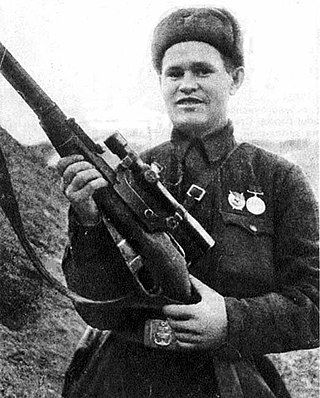
Vasily Grigoryevich Zaitsev was a Russian sniper during World War II.
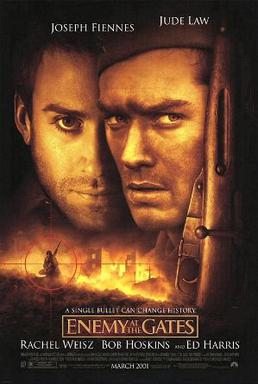
Enemy at the Gates is a 2001 war film directed, co-written, and produced by Jean-Jacques Annaud, based on William Craig's 1973 nonfiction book Enemy at the Gates: The Battle for Stalingrad, which describes the events surrounding the Battle of Stalingrad in the winter of 1942–1943. The screenplay was written by Annaud and Alain Godard. The film's main character is a fictionalized version of Vasily Zaitsev, a sniper and Hero of the Soviet Union during World War II. It includes a snipers' duel between Zaitsev and a Wehrmacht sniper school director, Major Erwin König.

The Order of the Red Banner was the first Soviet military decoration. The Order was established on 16 September 1918, during the Russian Civil War by decree of the All-Russian Central Executive Committee. It was the highest award of Soviet Russia, subsequently the Soviet Union, until the Order of Lenin was established in 1930. Recipients were recognised for extraordinary heroism, dedication, and courage demonstrated on the battlefield. The Order was awarded to individuals as well as to military units, cities, ships, political and social organizations, and state enterprises. In later years, it was also awarded on the twentieth and again on the thirtieth anniversary of military, police, or state security service without requiring participation in combat.

Vasily Ivanovich Chuikov was a Soviet military commander and Marshal of the Soviet Union. He is best known for commanding the 62nd Army which saw heavy combat during the Battle of Stalingrad in the Second World War.

Vasily Semyonovich Grossman was a Soviet writer and journalist.

Pavlov's House was a fortified apartment building which Red Army defenders held for 60 days against the Wehrmacht offensive during the Battle of Stalingrad. The siege lasted from 27 September to 25 November 1942 and eventually the Red Army managed to relieve it from the siege.

Rodion Yakovlevich Malinovsky was a Soviet military commander and Marshal of the Soviet Union. During World War II, he took part in several of the Red Army's key victories over Nazi Germany, including the Battle of Stalingrad and the Siege of Budapest. As Minister of Defence of the Soviet Union from 1957 to 1967, Malinovsky oversaw the strengthening of the Soviet Army and helped build up the image of the Soviet Union as a military superpower.

Viktor Platonovich Nekrasov was a Russian writer, journalist and editor.

Life and Fate is a novel by Vasily Grossman. Written in the Soviet Union in 1959, it narrates the history of the family of a Soviet physicist, Viktor Shtrum, during the Great Patriotic War, which is depicted as the struggle between two comparable totalitarian states. A multi-faceted novel, one of its main themes is the tragedy of the common people, who have to fight both the invaders and the totalitarianism of their own state. In 2021, the critic and editor Robert Gottlieb, writing in The New York Times, referred to Life and Fate as "the most impressive novel written since World War II."
The Battle of Stalingrad (1942–1943), a battle on the Eastern Front of World War II, often regarded as the single largest and bloodiest battle in the history of warfare, and one of the most decisive battles of World War II, has inspired a number of media works.

War of the Rats is a World War II fiction novel written by David L. Robbins in 1999.

They Fought for Their Country is a 1975 Soviet war film in two parts based on the eponymous novel written by Mikhail Sholokhov and directed by Sergei Bondarchuk. It was entered into the 1975 Cannes Film Festival. The film is the story of a Soviet platoon fighting a rearguard action during the German drive on Stalingrad. The film was selected as the Soviet entry for the Best Foreign Language Film at the 49th Academy Awards, but was not accepted as a nominee.
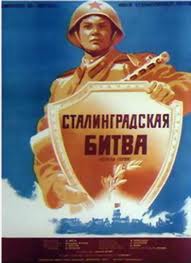
The Battle of Stalingrad is a 1949 two-part Soviet war film about the Battle of Stalingrad, directed by Vladimir Petrov. The script was written by Nikolai Virta.

Stalingrad is a 1990 two-part war film written and directed by Yuri Ozerov, and produced by Quincy Jones and Clarence Avant. Revolving around the eponymous Battle of Stalingrad, the film was a co-production between the Soviet Union and East Germany. It stars an ensemble cast featuring Powers Boothe, Mikhail Ulyanov, Bruno Freindlich, Fernando Allende, Sergei Garmash, Nikolai Kryuchkov, and Ronald Lacey.
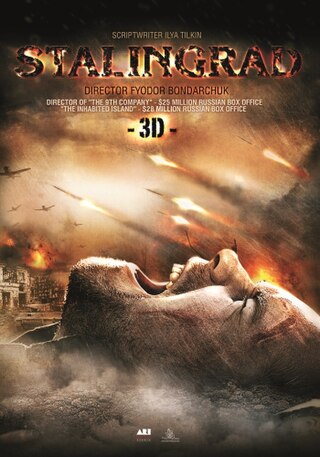
Stalingrad is a 2013 Russian war film directed by Fedor Bondarchuk. It was the first Russian movie released in IMAX. The film was released in September 2013 in Volgograd and October in Russia before its international release in subsequent months. The film was selected as the Russian entry for the Best Foreign Language Film at the 86th Academy Awards, but it was not nominated. Stalingrad received the I3DS Jury Award for Russia in 2014.
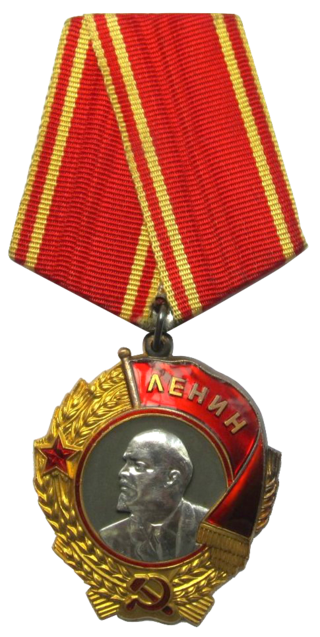
The Order of Lenin, was an award named after Vladimir Lenin, the leader of the October Revolution. It was established by the Central Executive Committee on April 6, 1930. The order was the highest civilian decoration bestowed by the Soviet Union. The order was awarded to:

Vasily Nikolaevich Gordov was a Soviet Army colonel general and Hero of the Soviet Union. Gordov commanded the Stalingrad Front between July and September 1942.
For a Just Cause is a socrealist novel by Russian writer Vasily Grossman, first published in 1952. A revised English translation, which includes additional material from Grossman's unpublished manuscripts, was published under the author's preferred title, Stalingrad, in 2019.The novel is the predecessor to Grossman's more widely read Life and Fate.


















